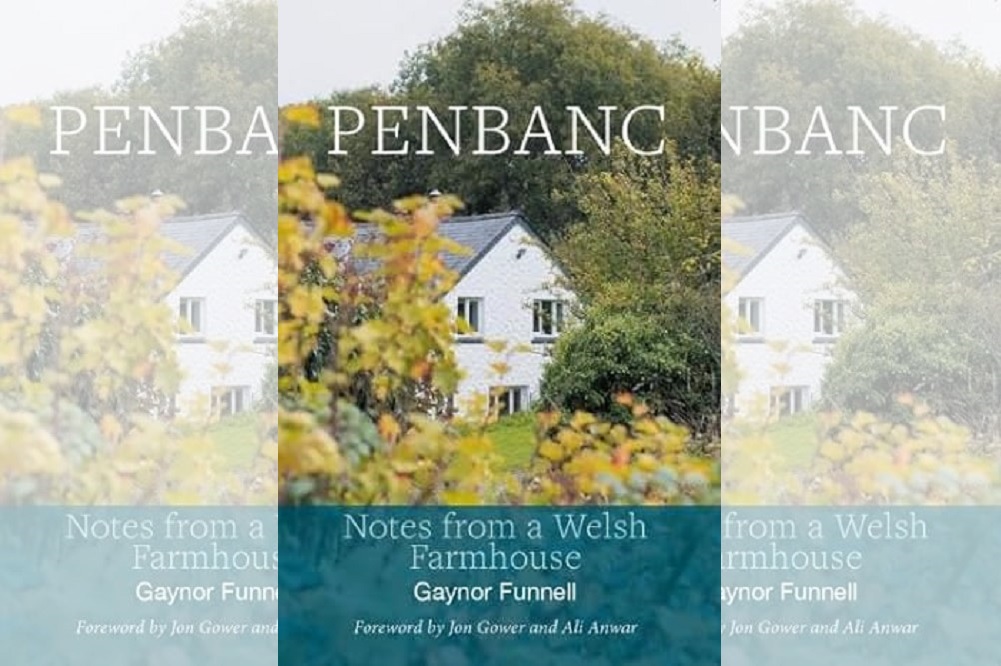Review: Penbanc – Notes from a Welsh Farmhouse by Gaynor Funnell, winner of the Nigel Jenkins Award, 2022

Lottie Williams
‘Why do some places hold you more than others?’ The rhetorical nature of Gaynor Funnell’s opening line in her debut nature-memoir, Penbanc, Notes from a Welsh Farmhouse, is true. Some places do hold you more, enveloping you into the stitch of their brick or along the curve of their contours by an invisible act of person and place osmosis, even if you have only been there for a short while.
Penbanc, a farm resting in the land of North Pembrokeshire, is where Funnell lived for a decade with her husband Dave, a menagerie of animals, and frequently visited by their grown up daughters. Despite a great affinity for her garden, and especially for the roses, it wasn’t until Dave’s death and the onset of Lockdown that Funnell really began to explore the surrounding land in all its seasonal complexities, and her small parcel of green became an entire world.
Each chapter (or section or essay, however you wish to name them) can be best described as a wordsmith’s cartography of the farm and Funnell’s place within it, including the fields, animals, Celtic woodland and the stream, to name but a few. Venturing beyond her boundaries, she also explores the wider landscape – the coastline, nearby settlements, lanes and historic monuments.
Chapter titles include ‘The Witch’s Cauldron’, which features a collapsed sea cave along the coast from Ceibwr Bay, ‘Gog and Magog’, a pair of sessile oaks, named after the two ancient oaks of Avalon, and ‘How far can a ladybird fly?’ (read the book to find the answer – it will surprise you!)
In each chapter, the reader is treated not only to a beautiful mosaic of nature writing that brings Penbanc to life, but also to its history – the Suffrage Movement and Bronze Age burial chambers, and to its folklore – crows, apples and the Mabinogion, with gentle touches of the climate emergency cloud-dotted throughout.
It is an encyclopaedia of place and time, and feels so fitting that Funnell is the winner of the Nigel Jenkins Literary Award 2022 when you consider how her eye for detail reflects that of Jenkins’s work.
Timelessness
It’s Funnell’s noticing of the intricate details and her natural descriptions that really set this book apart. She has layered her writing in watercolour, adding in tonal contrasts for the weather, season and her own mood, and embellishing the land with wordy texture, all of which have been carefully chosen.
She takes us from the ‘cathedral quiet of a huge beech tree’ to how the ‘stem of the bluebell is hollow and filled with sap, once used to bind pages onto the spines of books’.
Her knowledge of plants rivals the ripples in Ceibwr stream; self-heal, foxglove, hellebore. Hawthorn, blackthorn, sedum. She recognises birds from their appearance, character and sound, and then translates them onto the page for the reader – the tic-tac of the wren, the blackbird’s trill, the hover, glide and dive of a kestrel.
Her use of colour could be a paint chart for Farrow and Ball; burnt umber, smudge of smoke, cappuccino froth.
Despite writing about a specific period in her life, there is a nostalgic feeling of timelessness in Funnell’s writing. Perhaps this is due to a sense of past, present and future weaving its way through the chapters. Penbanc farmhouse itself is very old, and ‘looks like a house a child might draw, with uneven, chalk white walls and a smoking chimney’.
It is a house that families have lived in; the Rowlands, the Devonalds, the Biddyrs, and Funnell is able to breathe life into people no longer with us, of those who have lived and loved and worked and left where she herself has been. For her, the past is a gateway, not a barrier, and I get the feeling this is also how she views her future.
Gog and Magog
This is a future without Dave and without Penbanc. Without the animals and the fields and the sunsets. The decision to leave following her widowing was extremely difficult for Funnell, who ‘came to love the place more, even though it was brim-full of grief’. An unbearable kind of grief.
But even though Dave is no longer physically present to walk and work the land, his presence is keenly felt throughout, memories of him etched into the place he loved and never wanted to leave. Funnell’s recount of his funeral is both heartbreaking and uplifting in equal measure, his wake more of an all night drink-the-bar-dry, burgers and curry affair. This human connection really shines with the joy of the more-than human.
Take the story of Gog and Magog (the Penbanc duo, not the Avalon pair) as a beautiful metaphor. They were once so closely connected by branch and root until Magog was ‘poleaxed by a rare blast of northerly wind’ leaving Gog lonely, until it was discovered that a young Magog sapling was now able to thrive in the new light and space created by an absence.
The final piece of writing is for Dave. A beautiful, poignant ending that caught me completely by surprise and is such a fitting tribute. A tenderly raw, quietly evocative letter with flutters of lightheartedness that brings a feeling of daffodil yellow to the end of Funnell’s Penbanc journey, and to the past, the present and the future.
Penbanc – Notes from a Welsh Farmhouse by Gaynor Funnell is published by the H’mm Foundation and is available from good bookshops
Support our Nation today
For the price of a cup of coffee a month you can help us create an independent, not-for-profit, national news service for the people of Wales, by the people of Wales.





